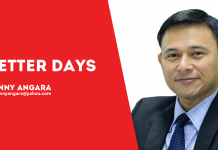DURING a recent Senate hearing, Commission on Population and Development (CPD) Executive Director Juan Antonio Perez said that anytime between 2030 and 2035, the Philippines could shift from a “young” to an “aging” society, where the proportion of senior citizens (aged 60 and above) will grow to at least 14 percent of the population. This roughly translates to our aged population ballooning from eight million today to a little more than 14 million in less than two decades.
Apparently, such pace is unprecedented in history. For instance, it took France 115 years to make the transition from “young” to an “old” society; the United States, 69 years; the Russian Federation, 50 years; and the United Kingdom, 45 years.
Definitely, such rapid societal aging has some serious policy implications — not least because aging is associated with increased morbidity and risks for non-communicable diseases (NCDs) like dementia and diabetes, not to mention ballooning healthcare costs.
A 2016 Asia Pacific Risk Center (APRC) report even estimated that among 14 Asia-Pacific economies — Japan, Hong Kong, Australia, New Zealand, Singapore, South Korea, Taiwan, China, Thailand, Vietnam, Malaysia, India, Indonesia and the Philippines — elderly healthcare expenditures between 2015 and 2030 would reach a cumulative US$20 trillion.
Such figure corresponds to the combined 2015 GDP of the 14 economies included in the APRC report, and accounts for up to half of the group’s projected healthcare costs for the said period.
It’s highly possible however that we are not even devoting nearly enough resources to care for our senior citizens properly. A report from the Retirement and Healthcare Coalition estimated that there were only 140 geriatric doctors operating in the country and cited that we do not even have properly trained and certified geriatric nurses in the country. Out of the 140 or so geriatric doctors, about half do not have actual clinic or hospital experience, largely due to lack of facilities where health professionals can train for this specialty.
To my knowledge, only St. Luke’s Medical Center (SLMC) has a dedicated Geriatric Center. And frankly, hospitals like SLMC are not the kinds of facilities that our marginalized elderly could easily access. This is why we’ve filed a measure in the Senate calling for the state-run National Center for Geriatric Health (NCGH) to be institutionalized and further strengthened, as a venue for research and training on caring for the elderly.
Beyond concerns over healthcare though, rapid societal aging also has serious ramifications on our social safety nets and pension systems. In the Expanded Senior Citizens Act of 2010 (RA 9994) of which I was an author while still a Congressman, a social pension (worth P500) for indigent senior citizens was included in the list of benefits that government should provide. We are now pushing, through SBN 1865, for this social pension to be doubled (P1,000) and extended to all senior citizens without any pensions — such as those provided under SSS and GSIS. According to estimates from the Coalition of Services of the Elderly (COSE), some 2.4 million senior citizens would benefit if our measure is enacted.
Clearly, rapid aging will have long-lasting and far-reaching effects on Philippine society. Hence, we co-authored a measure establishing a National Commission on Senior Citizens that will act as the main government agency for formulating, coordinating and monitoring policies and programs that promote the rights and privileges of the senior citizens’ sector.
The Philippines may still be a fairly “young” society, but that all only means now is the best time to lay down the policies and programs that make sure every Filipino is protected and secured in their twilight years.
***
Sen. Sonny Angara was elected in 2013, and now chairs the Senate committees on local government, and ways and means. (Email: sensonnyangara@yahoo.com| Facebook, Twitter & Instagram: @sonnyangara/PN)

